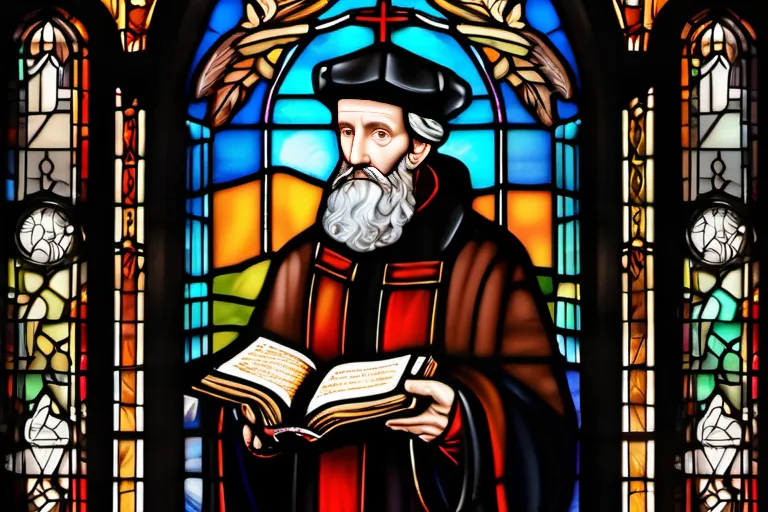Explore the core beliefs, history, and impact of Calvinism on Christianity.
Calvinism is a major branch of Protestant Christianity that originated in the 16th century during the Protestant Reformation. This article provides an in-depth look at the key tenets, history, and influence of Calvinism on Christianity.
The Origins and Founder of Calvinism
Imagine a moment when a single man’s ideas and writings shook the foundation of Christianity, much like a towering tree being uprooted by a mighty gust of wind. John Calvin, a Swiss theologian in the 16th century, was this storm that changed the course of religious history.
Calvin wasn’t just a scholar; he was a reformer. Born into a world where the Catholic Church held absolute power and control, Calvin sought to challenge the status quo. He did so not out of rebellion but from a deep sense of devotion and a desire for spiritual purity. His work, like The Institutes of the Christian Religion, which he authored in 1536, became a cornerstone of his teachings.
Calvin’s influence was profound because it wasn’t just about changing beliefs; it was about reshaping lives. He believed that true religion must be rooted in Scripture and lived out in daily life, much like planting seeds in fertile ground so they can grow into something strong and resilient. This emphasis on the Bible as the ultimate authority in matters of faith became a central theme in Calvinism.
Calvin’s ideas spread quickly through his teachings, which were shared not only by his students but also by those who read or heard about his work. His church in Geneva became a beacon for reform, drawing followers from across Europe. The way he structured the church and the state was revolutionary; it created a system where each member had a role to play, much like pieces of a puzzle fitting together perfectly.
Through his writings and teachings, Calvin introduced concepts that would become fundamental to Calvinism: predestination, total depravity, limited atonement, irresistible grace, and the perseverance of the saints. These ideas were not just theological arguments; they were reflections on human nature and God’s sovereignty in a world filled with suffering and sin.
John Calvin wasn’t just a historical figure whose name we learn about in school. He was a real person who lived and breathed his faith, making choices that would echo through the centuries. His legacy continues to shape not only Christian denominations but also the broader cultural and political landscapes of today.
Calvinist Beliefs: The Five Solas
What Are the Five Solas That Define Calvinism?
Calvinism, often misunderstood as a rigid and austere belief system, is actually built upon a set of foundational principles known as the five solas. These five terms—sola scriptura, sola fide, sola gratia, solus Christus, and soli deo gloria—are not just words strung together but powerful statements that differentiate Calvinism from other forms of Christianity. Have you ever wondered how a book can be the ultimate authority in matters of faith? That’s what sola scriptura means, emphasizing that the Bible alone is the source of all Christian truth.
Now, imagine standing before God, completely on your own without any help from others. That’s where sola fide, or faith alone, comes into play. It suggests that our salvation is purely by grace through faith in Jesus Christ, and not by good works or anything we might do.
Have you ever pondered the role of God’s unmerited favor in your life? Sola gratia underscores this idea, asserting that all our righteousness comes from the grace of God alone. It’s like being a passenger on a bus; you’re only there because someone else is driving and has chosen to take you along for the ride.
In Calvinism, Jesus Christ is central to everything. Solus Christus highlights this by emphasizing that salvation can be found in no one but Christ alone. It’s as if all the stars in the sky are pointing towards one single star—the star of Bethlehem, the birthplace of Jesus.
The last solum, soli deo gloria, or glory to God alone, encapsulates a profound humility and devotion. It’s about recognizing that any good we do comes from God and should be offered back to Him as praise. This belief is like acknowledging that the most beautiful garden is not just a product of nature but also the result of careful nurturing by a gardener.
These five solas form the bedrock upon which Calvinism stands, making it distinct in its emphasis on scripture, faith, grace, Christ’s centrality, and God’s glory. Understanding them can provide insight into why Calvinism has been so influential and enduring throughout Christian history.
The Role of Predestination in Calvinism
Predestination, a central tenet of Calvinism, has often left Christians questioning their place in the divine plan. How can a loving God predetermine who will be saved and who will not? Imagine life as a grand chess game; each piece moves according to an unseen board master. In this metaphor, predestination is like knowing every move before it’s made, ensuring a predetermined outcome. But for many, this concept seems contradictory to the fluid nature of human free will.
John Calvin himself wrestled with this concept, seeing it as a profound truth that underscores the sovereignty of God. For Calvinists, predestination is not about foregone conclusions but rather about understanding how divine grace operates. If you were to ask, ‘Why do some people receive salvation and others don’t?’ Calvinism answers with the idea that salvation is predetermined by God’s eternal will.
The implications of this belief are profound. It challenges our understanding of justice and mercy. How can a loving God allow suffering or damnation if He has already decided the outcome? This raises questions about the nature of sin, grace, and human responsibility. Some see predestination as a comforting assurance that God’s will is unshakable; others find it deeply troubling.
Calvinists argue that this doctrine does not negate personal choice or free will but rather elevates the role of divine sovereignty in salvation. It forces believers to contemplate their relationship with God and how they can best live their lives, given the knowledge that their fate is ultimately in His hands. As one might wonder, “Can a person truly have faith if everything is already decided?” This paradox lies at the heart of Calvinist theology.
The concept of predestination has also had significant social implications. It has been used to justify social hierarchies and even economic structures, as some interpreted it to mean that wealth or poverty could be signs of divine favor. Yet, others have found in this belief a message of humility, acknowledging the limits of human understanding.
Overall, predestination remains a complex and controversial aspect of Calvinism. It challenges believers to navigate between faith and doubt, grace and justice, all while recognizing the ultimate sovereignty of God. As we delve deeper into this doctrine, it becomes clear that its influence extends far beyond mere theological debate, shaping not just personal beliefs but also societal structures and ethical considerations.
Calvinism’s Influence on Church History
Calvinism’s Influence on Church History: Trace the Historical Development and Impact
Imagine, for a moment, if you will, that history is like a river, flowing through time and carrying with it currents of change. One such current is Calvinism, a branch of Protestant Christianity that emerged in the 16th century and has left an indelible mark on religious thought. But how did this movement begin, and what exactly set it apart from other denominations? Let’s explore its roots and its profound impact.
John Calvin, the reformer who gave his name to this movement, was born in 1509 into a France that was grappling with the tumultuous changes of the Protestant Reformation. He initially studied law but found his true calling in theology. When he wrote ‘Institutes of the Christian Religion’ in 1536, it was like throwing a stone into a tranquil lake; the ripples soon became waves, then stormy tides.
The rise of Calvinism wasn’t just about changing religious beliefs; it was also about redefining society. The movement spread rapidly through Switzerland and quickly to other parts of Europe, including England and Scotland. It challenged not only church doctrines but also political structures, advocating for a theocracy where church and state were intertwined.
One significant impact was seen in the governance of Geneva, which became a model for many Calvinist communities. The city-state operated under strict moral codes, reflecting Calvin’s belief in predestination and the importance of living a virtuous life as evidence of one’s election by God. This emphasis on moral rigor extended beyond religious boundaries into politics, economics, and education, making every aspect of public life reflect Christian principles.
Moreover, Calvinism’s influence extended far beyond Europe. The so-called “Great Awakenings” in the United States during the 18th and 19th centuries were heavily influenced by Calvinist thinkers like Jonathan Edwards. These movements emphasized personal piety and evangelism, reshaping American religious culture.
Calvinism also played a crucial role in the formation of various Protestant denominations. Groups like the Presbyterians, Congregationalists, and Baptists trace their roots back to the teachings of Calvin and his successors. Each of these groups adapted Calvin’s ideas in unique ways but maintained a core set of beliefs centered around predestination, grace, and the authority of Scripture.
In essence, Calvinism has been like a beacon guiding millions through periods of spiritual doubt and moral uncertainty. Its influence on church history is profound and multifaceted, touching not just religious doctrine but shaping entire societies along the way. As we delve deeper into its theology in the next chapter, consider how these ideas have evolved and continue to shape our understanding of faith today.
Calvinist Theology: Key Texts and Interpretations
When we delve into Calvinist theology, one cannot overlook the profound impact of key texts like Institutes of the Christian Religion. These works serve as a cornerstone for understanding Calvinism’s core beliefs and practices. How many times have these words shaped the thinking of believers across centuries?
Calvin’s Institutes, written in the 16th century, are like a blueprint for the theological structure of Calvinism. Here, Calvin systematically addresses topics such as the doctrine of God, man’s sinfulness, and the nature of salvation. Each section is carefully crafted to provide a clear, logical progression that makes it accessible yet deeply insightful.
When we read these texts, we are invited into a conversation with John Calvin himself. How does he define total depravity, where every part of man’s being is corrupted by sin? Can you truly grasp the depth and breadth of this doctrine through his lens?
The Institutes also explore the concept of predestination. How do these teachings challenge our understanding of God’s sovereignty over human affairs? Is it not a profound question to ponder, how much control does God have over our lives if He has already chosen who will be saved and who will not?
Calvin’s emphasis on the sanctification process is another crucial aspect. How do his teachings guide believers in living out their faith daily? Are we really expected to actively participate in our sanctification, or is it a passive acceptance of God’s will?
Moreover, Calvin’s discussions on church governance and the role of the state offer deep insights into how these institutions should function within society. How does he envision a harmonious relationship between religion and politics? Does his view resonate with modern understandings of secularism and religious freedom?
Through these texts, we see not just theological arguments but also practical applications that have shaped entire denominations and individual lives. As you explore Institutes, consider how each chapter builds upon the previous one to form a coherent and compelling narrative.
The Legacy of Calvinism Today
Have you ever wondered how a theological movement born centuries ago continues to shape the religious landscape today? Calvinism, named after its founder, John Calvin, has left an indelible mark on Christian denominations worldwide. It’s not just a historical curiosity; it’s a living, breathing force that influences contemporary beliefs and practices in profound ways.
Calvinism’s impact is evident in the structure of many Protestant churches, particularly in their governance through councils or synods rather than relying solely on individual leaders. This model mirrors Calvin’s belief in the collective wisdom of believers. In practical terms, this means that decisions are often made by groups of elders and ministers who work together for the good of the congregation.
But it’s not just in organizational structures that we see the legacy of Calvinism today. Its doctrines also permeate how Christians understand their roles in society. The idea of vocation, or calling, which emphasizes fulfilling one’s role with diligence and care, has become a cornerstone for many believers. This concept encourages Christians to view every aspect of life as an opportunity to serve God, whether it be in the workplace, family life, or community service.
Moreover, Calvinist teachings on predestination have sparked both deep reflection and passionate debate among scholars and laypeople alike. While some see it as a source of comfort and assurance, others grapple with its philosophical implications. How can we reconcile such a doctrine with the belief in free will? The tension here drives countless theological discussions and personal meditations.
Calvinism’s influence extends to social justice issues as well. Despite historical controversies, many contemporary Calvinists are at the forefront of advocating for equality and justice, seeing these values as essential expressions of their faith. This shift reflects a broader understanding that the principles of Calvin’s theology can be applied to address societal ills.
So, where does Calvinism stand in today’s rapidly changing religious landscape? Is it adapting or resisting change? The answer lies in its ability to reinterpret and apply its core doctrines in new contexts. As we move forward, one thing is clear: the impact of John Calvin’s teachings continues to resonate, shaping not only Christian thought but also broader cultural and social conversations.
Conclusion
 By understanding the foundational beliefs of Calvinism, we gain a deeper appreciation for its role in shaping modern Christianity. This guide serves as a valuable resource for those seeking to learn more about this significant movement within Christianity.
By understanding the foundational beliefs of Calvinism, we gain a deeper appreciation for its role in shaping modern Christianity. This guide serves as a valuable resource for those seeking to learn more about this significant movement within Christianity.











